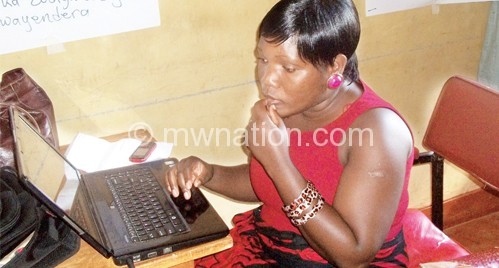Saving youths from doom

At the age of 18, Pemphero Chalera of Gongolo Village in T/A Kwataine, Ntcheu is not only bogged down in challenges of today’s youths such as unemployment, she is also a single parent with no source of income to nurture her three-year-old son Laurent.
Pemphero is just one of the many Malawian adolescents who have had to deal with the consequences of early pregnancies.
She recalls how she found herself in the situation.
“My boyfriend was only 19 and in Form Four, but he treated me well and showered me with gifts. To say I had not heard about condoms would be a lie, but the truth is that I could not gather the courage to discuss the use of condoms with my boyfriend,” says Pemphero.
Thus, she found herself pregnant, marking the end of her education journey, and her dream of becoming a nurse.
Speaking during a trainer of trainers [ToT] workshop for Sexual Reproductive Health in Ntcheu recently, Pemphero said it was lack of sound advice that made her engage in unprotected sex.
The TOT was organised by Youth Net and Counselling (Yoneco) under their ‘Reducing barriers to Adolescence Access to Sexual Reproductive Health (SRH) information and services (FP/RH) through Advocacy project.
Yoneco programmes support manager Sewenthe Mawhayo Chipofya says expanding SRH services for rural populations in Malawi is a project that builds on an existing project called ‘Reaching the Hard to Reach Population with SRH&R and HIV/Aids services and prevention of gender-based violence in Malawi.
The project is being implemented in Ntcheu and seeks to expand to Machinga, Zomba and Balaka. Chipofya says the aim of the project is to reduce HIV infection and prevalence among the remote populations that include fishers, teen mothers, married adolescents, sex workers, bicycle taxi operators and out of school youth.
“The project aims to increase the number of hard-to-reach populations accessing sexual and reproductive health and rights (SRH&R) as well as HIV and Aids prevention services in Zomba, Balaka, Nkhata Bay, Ntcheu, Rumphi and Machinga by November this year,” she says.
Chipofya further says current conventional interventions are not youth friendly, such that youths like Pemphero find it hard to go for SRH services for fear of being labelled prostitutes or promiscuous.
Fanny Mawaya, a nurse/midwife at Ntcheu District Health Office (DHO) says teen mothers, young married couples and adolescents need to be trained in life skills that would help them to be assertive and also cope with emerging issues such as family planning, complications of teenage pregnancies such as fistula, disability or even death.
“Youths should know it is a government policy and their right to access family planning services, unlike before when only adults would have access to such services. As a DHO, we have youth friendly health services to cater for them,” says Mawaya.
She says youths like Pemphero should not be apologetic about seeking hospital services such as contraceptives and cancer screening.
In light of this, Yoneco provided 30 youths and teen mothers from different youth clubs in T/A Kwataine’s area with training in condom distribution to enhance skills in condom use and counselling.
Chipofya said the condom distribution agents will help improve knowledge in the use of both male and female condoms, thereby reducing unwanted pregnancies and the spread of sexually transmitted infections (STIs), including HIV.
“We want to develop knowledge, skills, confidence and competence in the use of both male and female condoms as a method of fighting against STIs and unintended pregnancy, develop knowledge, skills and attitudes on how to communicate, counsel and assess the risk of clients,” she said.
She said the youth will develop skills in conducting condom-related activities such as community sensitisation and developing action plans.
Dalitso Kefa, 20, of Yeneya Village in the area of T/A Kwataine is a mother of one and an active member of Auze CBO where she takes part in training youths on HIV/Aids, family planning, and counselling on HTC services.
“I am married, but that does not stop me from helping other youths access vital sexual reproductive health information and other related services,” says Dalitso.
Ntcheu district youth officer Aberson Mwale says they are using youth networks because it is an effective way to reach other youths who shy away from clinics to get condoms and other SRH services.
“In our agreement with the Ministry of Health’s Sexual Reproductive Unit, we chose to work with Yoneco on condom distribution because it has an established network on the ground apart from having other interventions such as Life Skills and the Sister-to-Sister project which uses girls to inform other girls on SRH matters,” says Mwale.
Active promotion and use of male condoms has been proven to reduce the spread of HIV, and the promotion of female condoms has increased the number of protected sex. Use of condoms has been identified in the National HIV and Aids Policy (2004) and the National BCI Strategy for HIV/Aids and Sexual and Reproductive Health (2002), Malawi National Condom Strategy (2005) as an important way of preventing the spread of HIV.
This is why Yoneco is expanding SRH and Rights services for rural populations so that young girls delay pregnancies and get educated for a brighter future.






sewe sopano kuganizila mfundo za concepiti